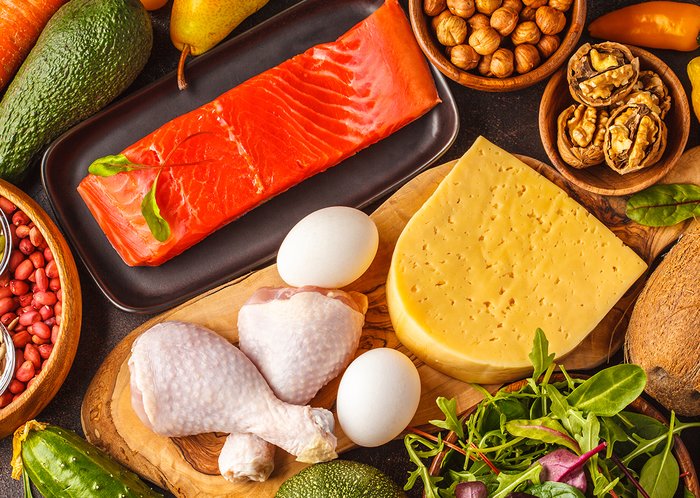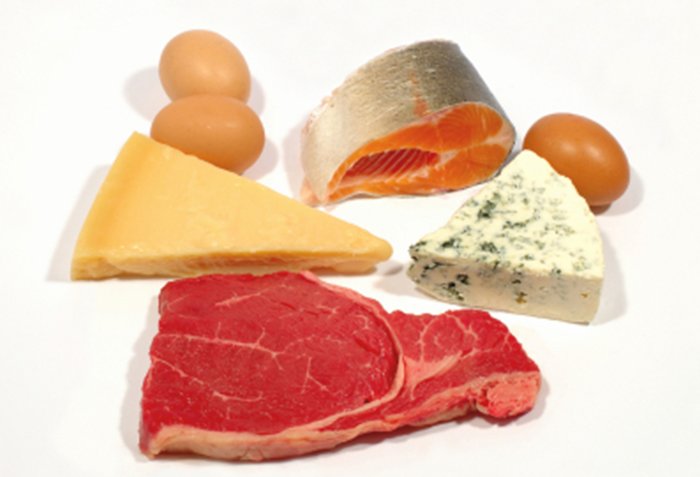Products You May Like
When you hear that someone is following a ketogenic diet, rarely do you hear they’re also trying to build muscle while doing so. The keto diet has a wide range of associations these days—fat loss, mental clarity, health and biohacking—but getting huge isn’t usually one of them. But there’s merit, and research, to support running a ketogenic diet to preserve and build muscle, too.
Bodybuilders have been following ketogenic diets—if not necessarily by that name—as part of show prep for decades, for instance. But during a growth or maintenance phase? Yes, it can work then, too.
But if you’re hoping to build muscle while eating keto, you’ll need to be very careful and intentional with every choice you make: what you eat, how much of it, and even when you eat it. You’ll also need to modify your “the more protein, the better” mindset, if that’s been your guiding nutritional principle in the past.
Ketogenesis and Protein: A Tricky Relationship
We know that getting adequate protein is crucial when it comes to building and maintain muscle mass. But as many lifters have discovered the hard way, that doesn’t mean that eating more protein will automatically lead to more muscle growth. If only!
Still, someone who isn’t following the ketogenic diet can keep piling on the protein without seeing much of a downside—except to their wallet and their digestion, perhaps. In the ketogenic diet, however, eating wildly excessive amounts of protein can actually kick you out of ketosis. This is why the ketogenic diet is usually considered to be a “moderate” protein diet, not a high-protein diet.
So, what’s “moderate?” As explained in the article “Ketogenic Diet: Your Complete Meal Plan and Supplement Guide,” an effective ketogenic diet should include 15-20 percent of total calories from protein. This is quite low compared to the 30-40 percent of calories from protein touted by most online nutrition calculators in the bodybuilding community when you set your goal as “muscle growth.”

But get this: A study published in the Journal of Sports Sciences found that consuming 0.6-0.8 grams of protein (evenly distributed between 3-4 meals while also in a calorie surplus) was adequate to optimize levels of muscle protein synthesis.[1] Devoting 15-20 percent of your calories to protein is enough to get you to that threshold.
Tempted to go higher, like the classic 1 gram per pound of body weight or higher? That’s a classic mistake for aspiring ketogenic dieters, and here’s why: When your body is deprived of carbs, eating too much protein can lead to some of the protein being converted into glucose, which knocks you out of ketosis. The result is you end up feeling like crap and dragging through your workouts because your body gets just enough carbs to stay carb-adapted, but without converting fully to the fat-burning benefits true ketosis has to offer!
Afraid of your gains melting away? Don’t be. When you follow a ketogenic diet, the prolonged absence of carbohydrates leads to an increased production in ketones, which are a byproduct of fat breakdown. One unique benefit of having elevated levels of ketones in your blood is that they’re muscle-sparing.
One ketone in particular, called beta-hydroxybutyrate (BHB), has even been shown in a small, human study to have a positive impact on muscle growth, specifically leading to a decrease in leucine oxidation while also promoting protein synthesis.[2] And when it comes to muscle growth, every little bit helps!
Still, it’s understandable to be hesitant about potentially cutting back on protein. Here are three ways to make sure that you’re getting the most out of every gram in your diet while following the ketogenic diet.
Keto Muscle-Growth Key 1: Focus on High-Quality Proteins
A high-quality protein source is one that contains all nine essential amino acids and is specifically rich in the key muscle-building amino acid leucine. Lower-quality proteins, like grains and legumes, aren’t usually on the menu for the ketogenic diet anyway. And the animal-based protein sources that are typical to keto are all fantastic sources of complete, high-quality protein.
Solid choices include eggs (both yolk and white), whole-fat milk, Greek yogurt, cheese, chicken, turkey, pork, beef, lamb, fish, and seafood.
As much as possible, get your protein from these sources, and you’ll give your body more of the amino acids it needs to preserve and add lean muscle mass.
Keto Muscle-Growth Key 2: Nail Your Protein Timing
Research in recent years has reinforced the idea that it’s not just how much protein you eat in a day that matters, but also when you eat it—or more specifically, how you space it out across the day.
To receive maximal benefit from the protein you consume, you should eat a specific amount of high-quality protein—enough to reach what is known as the “leucine threshold”—every few hours. And doing so consistently throughout the day, day after day and week after week, will yield some fantastic muscle-growth results—assuming you’re also in an overall calorie surplus and training hard consistently.

But once you’ve met this threshold at a meal—which is 25-35 grams of protein per meal for most individuals—there’s no added muscle-building benefit. This is especially true if it will kick you out of ketosis.
Keep it simple: Focus on eating 3-4 meals per day, each with a fairly consistent amount of protein, so that you can reach the leucine threshold at each meal.
Keto Muscle-Growth Key 3: Stay in a Calorie Surplus
Most people embark on a ketogenic journey to lose body fat. But if your body composition goal is to build muscle, a calorie deficit will not help you accomplish it. No matter what type of diet you follow, one thing that is always true is that your muscles need calories to grow!
Remember, the study mentioned earlier determined that consuming moderate protein was sufficient, provided the subjects spread out their meals and ate in a caloric surplus. That last part is key! While you’re doing keto, do your best to at least eat a maintenance number of calories. But if you’re looking to grow, definitely count calories to the best of your ability to make sure you’re in a surplus.
Sample Calories and Macronutrient Distribution
- Height: 71 inches
- Weight: 165 pounds
- Goal: Muscle growth
- Calorie Needs: 2,750 per day (determined using Bodybuilding.com’s calorie calculator)
Ketogenic Macronutrient Breakdown
- Protein: 550 calories (20%), 138 grams
- Carbohydrates: 138 calories (5%), 34 grams
- Fat: 2,063 calories (75%), 229 grams
Macronutrient Distribution
- 4 Meals Per Day: ~35 grams protein, 8 grams carbohydrates, 58 grams fat per meal
Want more info about fitness nutrition? Check out Bodybuilding.com’s Foundations of Fitness Nutrition course to learn the essentials of eating right for any goal.
References
- Phillips, S. M., & Van Loon, L. J. (2011). Dietary protein for athletes: from requirements to optimum adaptation. Journal of Sports Sciences, 29(sup1), S29-S38.
- Nair, K. S., Welle, S. L., Halliday, D., & Campbell, R. G. (1988). Effect of beta-hydroxybutyrate on whole-body leucine kinetics and fractional mixed skeletal muscle protein synthesis in humans. The Journal of Clinical Investigation, 82(1), 198-205.
